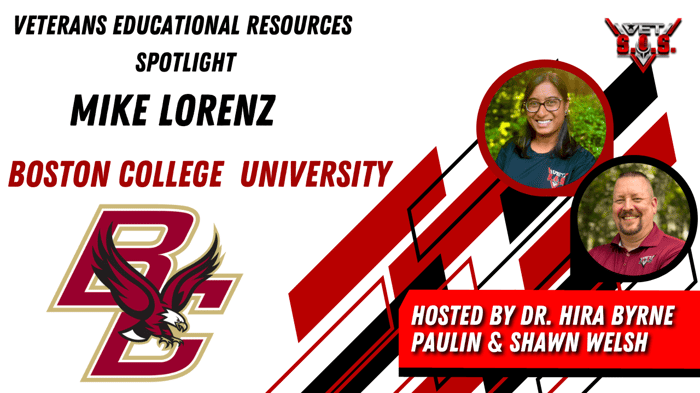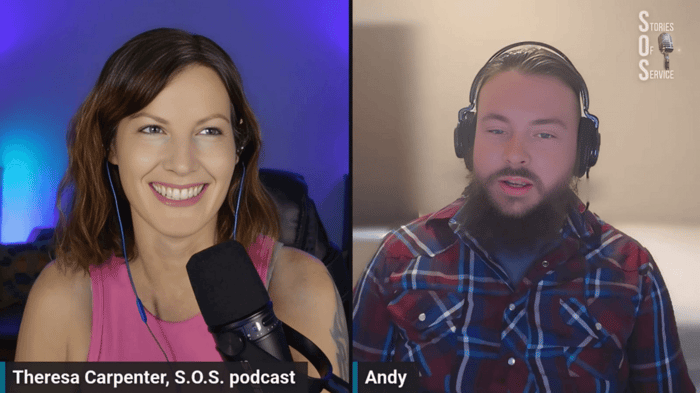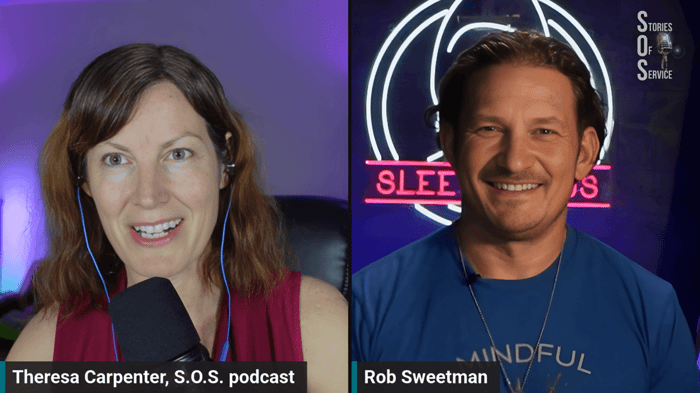How Boston College Veterans Thrive Through Purpose-Driven Support
When veterans consider their options for higher education, the search often begins with two questions: Will I be supported? and Will I find a sense of purpose here? For Boston College veterans, the answer to both is a resounding yes. Through intentional programming, dedicated leadership, and a mission-driven culture, Boston College is redefining what it means to be a veteran-friendly university.
In a recent episode of the VET S.O.S. Veteran Educational Resources Spotlight, Mike Lorenz, Director of Military and Veteran Support at Boston College, shared powerful insights into how the university serves its growing military-connected population. A 10-year veteran of the Air National Guard and a higher education professional with over 17 years of experience, Mike has spent the last four years building the college’s veteran support infrastructure from the ground up.
This article explores how Boston College veterans experience meaningful transitions, develop lasting community connections, and discover a renewed sense of mission beyond service.
A Veteran’s Transition Story That Sparked a Movement
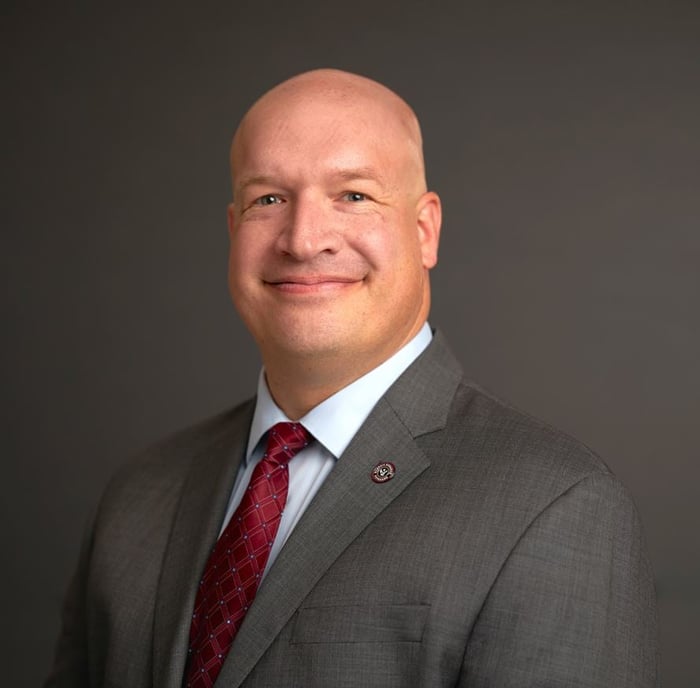 Mike Lorenz
Mike LorenzMike Lorenz’s military career was rooted in purpose—serving as an A-10 weapons loader with deployments to Iraq and Afghanistan. Like many in the Air National Guard, his transition was abrupt. “I turned in my gear, moved from Michigan to Boston, and was back at work within days,” he shared. “It was jarring. One moment you're carrying a weapon; the next, you're sitting in a campus meeting.”
That sudden reentry into civilian life left Mike disoriented and, for a time, angry. “People were complaining about the cold,” he recalled. “I had just come from the mountains of Afghanistan in winter. The disconnect was real.”
His experience is not unique among Boston College veterans or veterans nationwide. The transition from military to civilian life can be abrupt and isolating—especially for Guard and Reserve members. However, Mike transformed this challenge into an opportunity to ensure that future student veterans wouldn’t have to navigate it alone.
Building a Culture of Support for Boston College Veterans
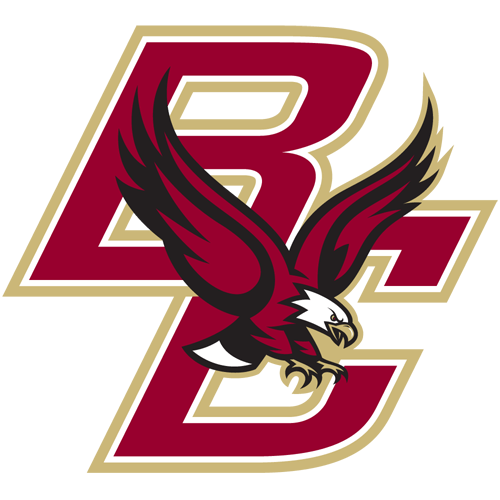 At Boston College, Mike leads a comprehensive support structure designed to serve the full spectrum of military-connected students. This includes veterans, active-duty members, dependents, and ROTC students. His approach emphasizes personalized care and flexible engagement.
At Boston College, Mike leads a comprehensive support structure designed to serve the full spectrum of military-connected students. This includes veterans, active-duty members, dependents, and ROTC students. His approach emphasizes personalized care and flexible engagement.
The Boston College veterans program offers:
A veterans lounge equipped with snacks, a refrigerator, and space to relax or study.
Regular tailgating events during football season to promote community and school spirit.
A Student Veterans Association and a law school veterans group for additional peer engagement.
Easy access to Mike himself—students are encouraged to drop by, email, or call with any question, big or small.
“We’re not trying to force anyone into a mold,” Mike explained. “Some veterans want a tight-knit community. Others prefer to fly under the radar. Both are welcome here.”
This adaptability is a cornerstone of the Boston College veterans approach. It ensures that every student can access the resources they need without being pressured to over-engage.
Mission-Driven Education Aligned with Military Values
A key differentiator for Boston College veterans is the school’s Jesuit mission: to be people for others. While the university welcomes people of all faith backgrounds, the spirit of service and social responsibility is deeply embedded into its academic and cultural fabric.
“We want students to leave Boston College and do something meaningful with their degrees,” Mike said. “That resonates strongly with veterans who already have a deep sense of service.”
This mission-driven ethos means that Boston College veterans are surrounded by faculty and peers who value purpose just as much as professional success. Whether students are pursuing careers in public service, business, or education, they are supported in finding ways to make an impact.
Faculty, Staff, and Alumni Engagement
Boston College takes pride in its entire military-connected community—not just students. The university is home to over 75 faculty and staff members who are veterans, creating additional layers of support and mentorship.
For Boston College veterans, this means more than just networking. It creates a sense of shared experience across every level of campus. Professors, administrators, and even alumni understand the unique journey of military life, offering advice and encouragement when it’s needed most.
Mike also collaborates with alumni to offer students unique access to events, speakers, and career opportunities. “When Admiral Stavridis came to campus, I grabbed a few student veterans and got them into a private session with him,” Mike shared. “That kind of access builds confidence and connections.”
Admissions and Pre-Arrival Outreach
Unlike many schools where admissions and veterans services operate separately, Boston College’s model encourages collaboration. Mike works closely with undergraduate admissions to review military-affiliated applications and translate military service into academic potential.
“My name and contact info are plastered all over our site,” Mike said. “If you’re a veteran or family member with questions—about the GI Bill, course selection, anything—I’ll respond. Always.”
This accessibility is crucial for prospective Boston College veterans, who may feel overwhelmed by the application process. From admissions to academic advising, Boston College ensures that military-connected applicants receive clear, personalized guidance from day one.
Real Community, Real Impact
While Boston College may not boast the largest veteran population, it excels in community impact. With roughly 160 student veterans, 50+ ROTC cadets, and dozens of dependents, the university maintains a tight-knit but diverse population.
The Boston College veterans community participates in various service activities, including:
Volunteering at Brighton Marine, a local veterans' support organization.
Hosting care package drives through student associations.
Partnering with nonprofits like Wounded Warrior and Blue Star Families.
Joining citywide efforts like the Run to Home Base and Boston’s Memorial Day flag-planting.
These hands-on efforts offer Boston College veterans a chance to continue serving—even as students. And because the groups are small, every participant sees the direct impact of their involvement.
Finding Your Fit: Advice for Veterans Considering Boston College
When asked what advice he would give to a veteran choosing a school, Mike didn’t hesitate: “Follow your gut. If it feels right, great. If not, that’s okay too. I’ll help you find a place that does.”
This philosophy captures the essence of what Boston College veterans experience: respect, individual attention, and a commitment to helping each student thrive.
From flexible support systems and veteran-friendly faculty to mission-driven academics and personalized admissions help, Boston College is setting a new standard for what military-connected students should expect from higher education.
Conclusion: Why Boston College Veterans Choose Purpose Over Prestige
The transition to civilian life can be daunting—but it doesn’t have to be isolating. Boston College veterans benefit from a support network that sees them as individuals with rich life experiences, not just enrollment numbers.
With a deep-rooted commitment to service, strong mentorship across campus, and a vibrant (albeit small) veteran community, Boston College provides the structure and care needed to turn transition into transformation.
For military-connected students seeking meaning, mission, and momentum in their next chapter, Boston College is more than a school—it’s a lifeline.
